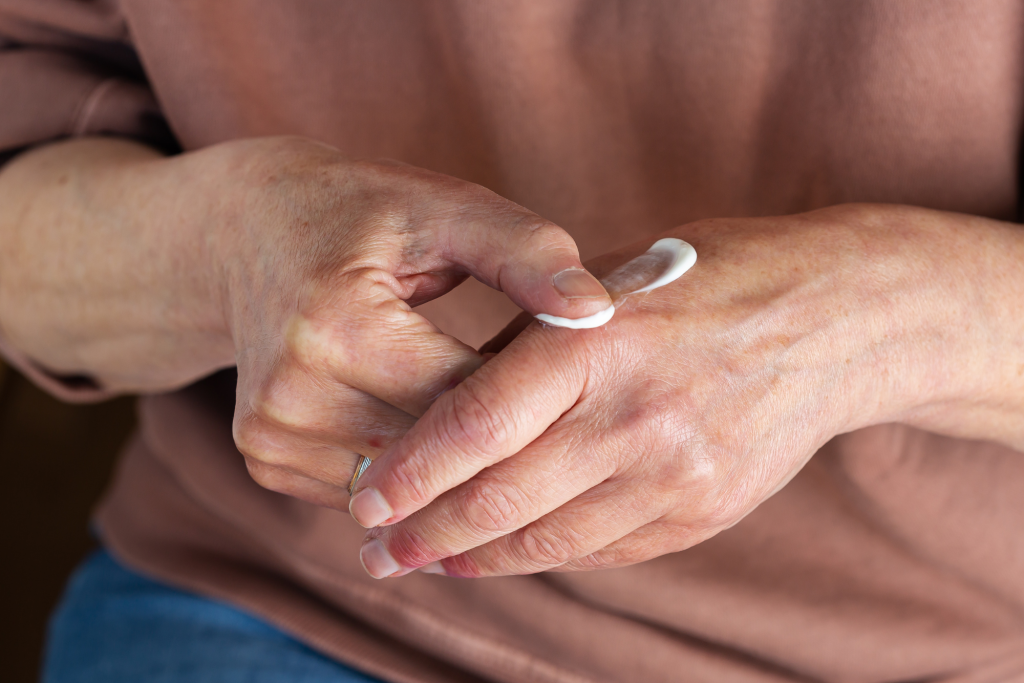Topical Therapy for Psoriasis
Topical therapy for psoriasis includes over the counter moisturisers and prescription medications. Using them as prescribed is very safe and important to controlling your psoriasis.
Topical Therapy
Topical therapy includes over the counter moisturisers and prescription medications. Using them as prescribed is very safe and important to controlling your psoriasis.
Topical Therapy for Psoriasis
Topical medications are creams, lotions and ointments that are applied directly to the skin. They may either be over the counter, pre-formulated by the manufacturer or compounded, whereby a pharmacy will make a tailored formulation based on the dermatologist’s prescription.
Our dermatologists tailor treatment plans based on the individual’s specific condition, considering factors like the type and location of psoriasis lesions, overall health, and treatment preferences.

First Line of Psoriasis Treatment and Maintenance
They can be utilised for all levels of disease severity and are generally a major cornerstone of psoriasis maintenance and management. In broad terms, topical medications help reduce inflammation, normalise skin cell turnover, and improve the integrity of the skin. Our dermatologist will discuss which medications would be most useful in your specific circumstance during your review. They will consider the severity of your psoriasis, the location of your plaques and your Quality of Life index when making a decision about the most appropriate medications for you.
Common Topical Treatments
Here, we go through the some of the most commonly prescribed topical medications:
Corticosteroids
Corticosteroids are the most commonly prescribed medications for all forms of psoriasis. They may be in the form of creams, lotions, ointments, gels, foams and shampoos. They are utilsed to reduce inflammation in areas of psoriasis. Your dermatologist will prescribe stronger steroids for less sensitive or severe areas, and milder steroids for sensitive areas such as the face or groin.
Calcineurin Inhibitors
These are non-steroidal anti-inflammatory creams, that can be either be preformulated or compounded. They are particularly useful for sensitive areas such as faces and flexures. They can be used in adults and children and are generally well tolerated.
Salicylic Acid
Salicylic acid is also utilised to reduce the thickness of psoriatic plaques. It is often compounded in combination with tars, and can be used in thicker plaques as well as palms and soles.
Dithranol
Dithranol is another traditional anti-psoriasis medication, that was used for many years to slow down skin cell growth and reduce inflmamaion. It is largely now of historical interest due to the ease of use of newer medications, as well as the fact that it can irritate the skin and stain clothing.
Vitamin D Analogues
These are various forms of Vitamin D, which can be applied to the skin to slow skin cell growth in psoriasis. In Australia, Vitamin D is formulated in combination with a topical corticosteroid as a foam that can be used on much of the body, including the scalp. This also has the added benefit of reducing the inflammation, redness and discomfort in the areas of psoriasis.
Tar Preparations
Tar is one of the cornerstones of traditional psoriasis treatment has been used for hundreds of years in various forms to reduce inflammation in many skin conditions. It can help thin out thicker psoriasis plaques as well as reduce the inflammation. It can be compounded as creams, ointments, and can also be found in shampoo form.
Vitamin A
Vitamin A, in the form of Retinoids, can be of assistance in aiding the thinning of plaques, and turning over skin cells in thicker forms of psoriasis.
Book Your Initial Review
Book an initial consultation to find out which treatment plan is best for you.
